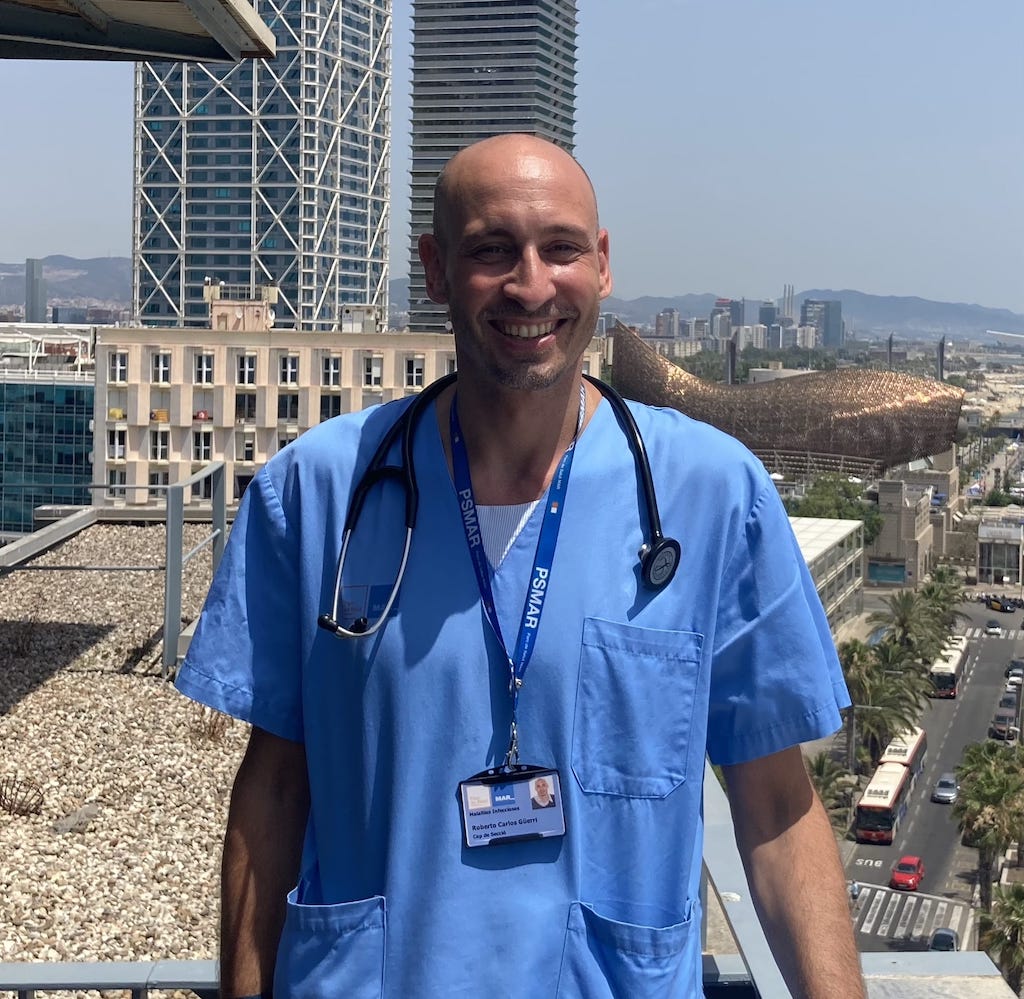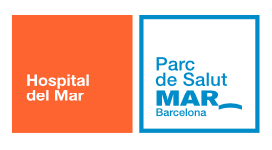
Doctor Robert Güerri
Dr. Güerri, section chief of the HIV Unit in the Infectious Diseases Service, researcher in the Infectious Pathology and Antimicrobials research group at the Hospital del Mar Medical Research Institute (IMIM), is a graduate of the University of Barcelona and has been specialising in internal medicine since 2009. He also holds a Master’s degree in the Application and Control of Hospital Antimicrobial Therapy from the UAB and is a Doctor of Medicine summa cum laude from the same university. Moreover, he is a Research Associate at the University of California, Davis.
A long and successful career, and always at the Hospital del Mar. Would you say it is part of our neighbourhood and a healthcare reference?
Without a doubt. I have been linked to this hospital for 18 years. From the medical point of view, I was born, and grew up here. I have experienced the evolution of the hospital. It is a place, where the quality of care is extraordinary. The group of people that work there, is focused on patient care. I have worked in other hospitals, both in Spain and abroad, and the way things work here is unique. I feel very proud of being part of this team.
Another differential value of the hospital is the PRRB (Barcelona Biomedical Research Park). We do not place enough value on this, but there are very few hospitals that, so clearly, have a first-class hospital centre, alongside with the investigation centre of the same quality. PRRB is a complex in which a lot of different institutions devoted to pure research coincide. Hospital del Mar itself has a medical research institute at the PRRB, called IMIM. This makes the interaction unhindered. You can find answers to many of the issues you experience from the clinical point of view, at the bedside with the patient, by doing some research on the topic. It is a very lively network, where new projects and ideas come up continuously, but most of all, where you can find answers and solutions.
Let’s talk about your work and your research in the HIV field.
Hospital del Mar has historically been and continues to be a reference centre of the treatment of HIV, from the medical point of view, in the practice and when administering treatment. But it is not only that. The clinical and research coexistence mentioned above, has led us to seek answers, and develop different investigation paths, in order to try to improve the life quality of our patients. At the moment, we are not able to compete on equal terms with other centres that have a lot more resources. We do not have, for instance, the capacity or infrastructure to develop an HIV vaccine, but, on the other hand, we do have the resources to try to find out why these people age prematurely or develop certain diseases more quickly. How to stop this, is something that we can work on, and in fact, those are the investigation paths we are developing at the moment. We are very potent when it comes to studying comorbidity, which are the other diseases that arise as a result of living with HIV for many years. This is something we have been working on in the last few years.
First HIV (AIDS) and now Covid. You said that we “have to assume that Covid will never end”.
You see, Covid does not stop. Between March and June 2020, we were hoping that as soon as we got through the first wave, we would get the vaccine and it would all disappear. But it is obvious that it was not and will not be the case. It is a new infection that has come here to stay and will be hitting us more or less periodically. Moreover, we do not know if it is going to be seasonal or all year round. It is evident, that Covid will become another virus with which we have to coexist, just like we coexist with the flu and millions of other viruses. What happens, is that this virus has already caused and continues causing a lot of harm. We must be alert. And that, as always, implies more research.
We have the image of a patient with the Covid with his ICU bed on the Promenade.
The interesting thing about it, is that it is not an anecdote. It is part of a project run by our colleagues from the intensive care unit called “humanise ICU”. The photography went round the world, but this is done here on a daily basis. A patient who is admitted to the ICU for 3 months, lying on his bed, totally dependent, practically without being able to move, with hardly any visitors and without being able to see the sun… Taking a patient in this situation out to see the beach, the breathe in sea air and feel the surroundings, cheer them up tremendously. The ones who have experienced it notice and appreciate it.
You are present at the Scientific Advisory Committee of the COVID-19 of the Generalitat. Do we approve the actions of the governments in the management of the pandemic?
Not all the authorities have acted the same way. The situation, especially at the beginning of the pandemic was so unexpected for all of us – including the medical staff – that it caught us by surprise. Nobody can be held responsible. In same cases, the administration may be slow, but that is in its nature. I think, the best thing they did was to leave the situation in the hands of the health professionals. Maybe we felt a bit alone, but on the other hand it allowed us to organise ourselves in our own way and give a better response, at least to our environment.
And the citizens? We took the first confinement relatively well, but every new wave seems to cost us more.
We cannot ask for much more. During the first wave, which was the hardest one, everything that had to be done, was done, and all of us did it. After that, some things could have been improved, perhaps when it comes to transmitting the importance of some measures. It is not enough to say, “this has to be done, whereas that is something prohibited” but it is necessary to try to explain it better. But in general, I believe that we, the citizens, have dealt with it with great dignity.
Nature, laboratory… Will we ever know for sure the origin of Covid?
All the evidence shows that this is a natural evolutionary leap. There are conspiracy theories, but there are experts in genetics who claim that these types of mutations do occur. All the evidence we have indicates this is an evolutionary leap that by probability can and occur constantly in nature.
Studying in our universities and developing their work in our hospitals. But hadn’t we agreed that our researchers should emigrate?
I am a doctor, and the type of research I conduct is medical. My colleagues who are biologists, biotechnologists and biochemists do have a more complicated situation. Carrying out research here is full of obstacles, without a budget and in lamentable conditions. It is obvious they should emigrate, and on a lot of occasions for good. But in terms of training, we have nothing to be ashamed of. Ours is an extraordinary one. The problem is what comes after, the labour world.
We live in a time of new threats in which budgets are increased. With Putin we increased the military budget. As to Covid, is the health budget sufficiently increased?
No, it is not. The healthcare system is underfunded at all levels. It is clear the healthcare system may be a bottomless well in a sense that no matter how much money you throw in it, you will never reach perfection. But we are now at a turning point, and with all that has happened, the healthcare system needs to be rethought. What do we want? How do we want it? The medical care needs to be rethought as well. I, for instance, believe in telemedicine but under some conditions. It is not a mere telephone call. We need to redefine what the future of health care should be in general. It is not only about the money, but there also needs to be a plan behind it. But, above all, in order to make decisions, it is necessary to count on those who are at the bedside, who are there on a day-to-day basis. If the decisions come from the outside world, or from above, often the idea, without being bad, lacks real applicability and fails. And this happens many times.
More residents than ever. Is vocation growing among young people?
In order to work in the healthcare sector, one requires a high degree of dedication to service. The Covid has showed us that we doctors, can be helpful and that always attracts young people. But all this should be channelled, and not run up against a bureaucratic wall, lack of opportunities and unfavourable conditions, or we will turn these vocations into frustrations.
To finish it off, doctor, please encourage us with some inspiring news.
From the medical point of view, we are living through difficult times, but we have already gone through what was the pandemic at the beginning. We must look to tomorrow thinking that things will never be exactly how they used to be, as there is a virus among us that forces us to change. But we must face the future with optimism. The virus will remain, but we will live with it, recovering our projects, illusions and continuing with our lives.
“Very few hospitals in the world can pride themselves on having a first-class hospital centre, alongside with the investigation centre of the same quality (PRRB – Barcelona Biomedical Research Park)”.

